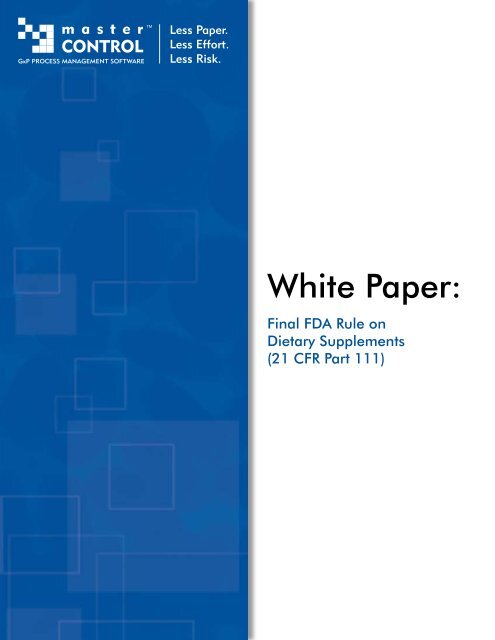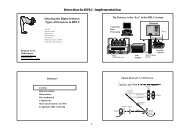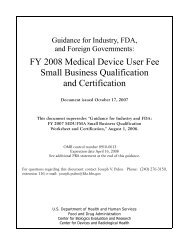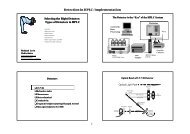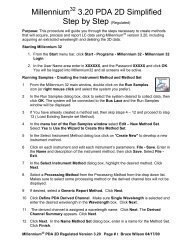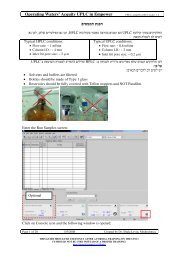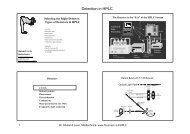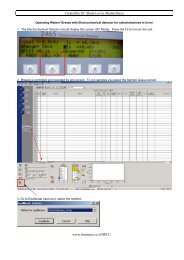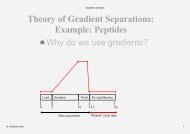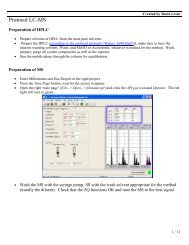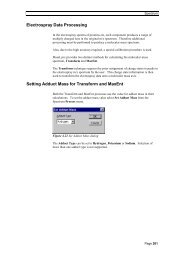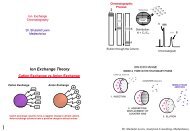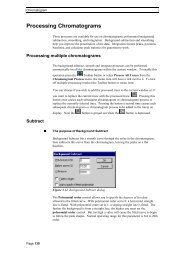White Paper on Dietary Supplements
White Paper on Dietary Supplements
White Paper on Dietary Supplements
Create successful ePaper yourself
Turn your PDF publications into a flip-book with our unique Google optimized e-Paper software.
<str<strong>on</strong>g>White</str<strong>on</strong>g> <str<strong>on</strong>g>Paper</str<strong>on</strong>g>:<br />
Final FDA Rule <strong>on</strong><br />
<strong>Dietary</strong> <strong>Supplements</strong><br />
(21 CFR Part 111)
Final FDA Rule <strong>on</strong> <strong>Dietary</strong> <strong>Supplements</strong> (21 CFR Part 111)<br />
<str<strong>on</strong>g>White</str<strong>on</strong>g> <str<strong>on</strong>g>Paper</str<strong>on</strong>g><br />
In June 2007, the U.S. Federal Drug Administrati<strong>on</strong> issued the <strong>Dietary</strong> Supplement Current Good<br />
Manufacturing Practice (CGMP) Final Rule (21 CFR Part 111). In essence, the final rule requires that<br />
the proper c<strong>on</strong>trols be in place for dietary supplements during manufacturing, packaging, labeling, and<br />
holding operati<strong>on</strong>s.<br />
This whitepaper discusses:<br />
•<br />
•<br />
•<br />
•<br />
The purpose of the CGMP final rule;<br />
Companies that will be affected;<br />
Specific requirements of the CGMP final rule and the challenges these requirements present; and<br />
How automated soluti<strong>on</strong>s can help.<br />
Purpose of the CGMP Final Rule<br />
The purpose of the CGMP final rule is to establish quality standards for dietary supplements. Until<br />
recently, the FDA has tended to view itself as filling more of a “watchdog” role as far as dietary<br />
supplements are c<strong>on</strong>cerned, with the FDA’s MedWatch c<strong>on</strong>sumer complaints hotline serving as the<br />
alert system.<br />
This watchdog role led to the voluntary recall of the dietary supplement Nasutra in September 2006,<br />
after it was discovered that the dietary supplement c<strong>on</strong>tained an analogue of sildenafil (acetildenafil),<br />
the active pharmaceutical ingredient in Viagra. According to the FDA press release announcing the<br />
recall:<br />
Acetildenafil is an analogue of sildenafil. Sildenafil is the active pharmaceutical ingredient in<br />
Viagra, an FDA-approved drug that is used to treat erectile dysfuncti<strong>on</strong> (ED). Acetildenafil is<br />
close in structure to sildenafil and is expected to possess a similar pharmacological and adverse<br />
event profile. 1<br />
By imposing quality standards, the new ruling will also protect c<strong>on</strong>sumers against supplement<br />
manufacturers who misrepresent the quantity of a product’s active ingredient, or d<strong>on</strong>’t disclose<br />
everything about their product’s ingredients. The recall of FiberChoice’s multivitamin, for example,<br />
was initiated after it was discovered that the product c<strong>on</strong>tained fish gelatin, a known allergen, which<br />
was not disclosed <strong>on</strong> the product label. 2<br />
Moreover, the final rule provides c<strong>on</strong>sumer access to dietary supplements that meet quality standards,<br />
are free from c<strong>on</strong>taminati<strong>on</strong> and are accurately labeled. This will give c<strong>on</strong>sumers greater c<strong>on</strong>fidence<br />
that a dietary supplement has been manufactured to ensure its identity, purity, strength, and<br />
compositi<strong>on</strong>.<br />
The FDA points out that the ruling addresses <strong>on</strong>ly the quality of the manufacturing process for dietary<br />
supplements and the accurate listing of supplement ingredients. It does not limit c<strong>on</strong>sumer access to<br />
2
Final FDA Rule <strong>on</strong> <strong>Dietary</strong> <strong>Supplements</strong> (21 CFR Part 111)<br />
<str<strong>on</strong>g>White</str<strong>on</strong>g> <str<strong>on</strong>g>Paper</str<strong>on</strong>g><br />
dietary supplements; nor does it address the safety of a dietary supplement’s ingredients or effect <strong>on</strong><br />
health when proper manufacturing techniques are used. 3<br />
N<strong>on</strong>etheless, cases such as Nastura, in which a previously unknown ingredient (acetildenafil) resulted<br />
in potential harm to a group of c<strong>on</strong>sumers, obviously would be included under the purview of the<br />
FDA’s final rule. It is interesting to note that, according to Taiwan’s Department of Health, the<br />
acetildenafil incident appeared to be an instance of an ingredient being illegally adulterated into a<br />
dietary supplement. 4<br />
Companies Affected by the Final Rule<br />
The provisi<strong>on</strong>s in the CGMP final rule (21 CFR Part 111) apply to manufacturers of n<strong>on</strong>prescripti<strong>on</strong><br />
dietary supplements intended for human use. N<strong>on</strong>prescripti<strong>on</strong> dietary supplements are a subcategory<br />
of nutraceuticals. The latter include a broad category of nutriti<strong>on</strong>al products ranging from isolated<br />
nutrients and dietary supplements, to genetic engineering products such as broccoflower (a hybrid<br />
produced by crossing broccoli and cauliflower).<br />
According to the FDA, the dietary supplements affected by the final rule include:<br />
•<br />
•<br />
•<br />
•<br />
•<br />
Vitamins and minerals;<br />
Herbs and other botanicals;<br />
Amino acids;<br />
<strong>Dietary</strong> substances for increasing total dietary intake;<br />
C<strong>on</strong>centrates, metabolites, c<strong>on</strong>stituents, extracts or a combinati<strong>on</strong> of the preceding ingredients<br />
that meet other criteria in Secti<strong>on</strong> 201(ff)(2)-(3) of the Federal Food, Drug and Cosmetic Act, as<br />
amended.<br />
The FDA’s CGMP requirements apply to all domestic and foreign companies that manufacture,<br />
package, label or hold dietary supplements, including those involved with testing, quality c<strong>on</strong>trol, and<br />
dietary supplement distributi<strong>on</strong> in the U.S.<br />
Specific Requirements of the Final Rule<br />
In additi<strong>on</strong> to requirements having to do with equipment, cleanliness of the facilities and related<br />
matters, the final rule requires manufacturers of dietary supplements to:<br />
•<br />
•<br />
•<br />
•<br />
•<br />
•<br />
Establish procedures for quality c<strong>on</strong>trol operati<strong>on</strong>s;<br />
Effectively handle deviati<strong>on</strong>s and n<strong>on</strong>c<strong>on</strong>formances (i.e., unanticipated occurrences);<br />
Employ qualified employees and supervisors;<br />
Keep a written record of each product complaint related to CGMPs;<br />
Immediately report serious adverse events to the FDA (this is actually a 2006 FDA requirement);<br />
and<br />
Maintain records.<br />
3
Final FDA Rule <strong>on</strong> <strong>Dietary</strong> <strong>Supplements</strong> (21 CFR Part 111)<br />
<str<strong>on</strong>g>White</str<strong>on</strong>g> <str<strong>on</strong>g>Paper</str<strong>on</strong>g><br />
Staggered Three-Year Phase-In<br />
To limit disrupti<strong>on</strong> to small businesses, the CGMP final rule stipulates a staggered three-year phase-in<br />
according to the following schedule:<br />
•<br />
•<br />
•<br />
Companies with 500 or more employees must comply by June 2008<br />
Companies with between 21 to 499 employees must comply by June 2009<br />
Companies with fewer than 20 employees must comply by June 2010<br />
Challenges of Establishing/Maintaining Compliance, and How Automated Soluti<strong>on</strong>s can Help<br />
This secti<strong>on</strong> discusses some of the challenges presented by the final rule’s requirements, and how<br />
automated soluti<strong>on</strong>s can help with these challenges.<br />
CGMP Requirement to<br />
Establish Procedures for Quality C<strong>on</strong>trol Operati<strong>on</strong>s<br />
Under the final rule, written procedures must be established for quality c<strong>on</strong>trol operati<strong>on</strong>s. These<br />
written procedures must include the steps to be followed when c<strong>on</strong>ducting a material review and<br />
making a dispositi<strong>on</strong> decisi<strong>on</strong>.<br />
The final rule requires that quality c<strong>on</strong>trol pers<strong>on</strong>nel c<strong>on</strong>duct a material review and make a decisi<strong>on</strong><br />
regarding dispositi<strong>on</strong> when, for example, a batch deviates from its master manufacturing record,<br />
an unanticipated event occurs during a manufacturing operati<strong>on</strong> that leads to the adulterati<strong>on</strong> of<br />
any porti<strong>on</strong> of a dietary supplement (including its packaging), or when there is a problem with the<br />
equipment or calibrati<strong>on</strong>, etc.<br />
Difficulties in establishing (and maintaining) procedures for quality c<strong>on</strong>trol operati<strong>on</strong>s:<br />
Without a centralized, document c<strong>on</strong>trol/management soluti<strong>on</strong>, it can be difficult to establish (and<br />
maintain) written procedures for quality c<strong>on</strong>trol operati<strong>on</strong>s. This is because, with a manual system<br />
(as well as a decentralized, hybrid system), there is no foolproof mechanism in place to ensure that<br />
employees are using the most current, most up-to-date versi<strong>on</strong> of a documented procedure. This can<br />
result in c<strong>on</strong>fusi<strong>on</strong>, inefficiencies, and poor quality c<strong>on</strong>trol.<br />
An automated document c<strong>on</strong>trol/ management soluti<strong>on</strong> can help in the following ways:<br />
•<br />
•<br />
A centralized repository that c<strong>on</strong>sists entirely of quality procedures that have been routed, approved,<br />
and signed off <strong>on</strong> (via FDA-approved electr<strong>on</strong>ic signatures) ensures that every document in the<br />
repository is the most recent, up-to-date versi<strong>on</strong>. (Any previous versi<strong>on</strong> is automatically archived<br />
and replaced by the current versi<strong>on</strong>.)<br />
A secure, time-stamped audit trail helps assure compliance by identifying the pers<strong>on</strong> who created or<br />
modified the electr<strong>on</strong>ic record, when the acti<strong>on</strong> occurred, and what changes were made.<br />
4
•<br />
•<br />
Final FDA Rule <strong>on</strong> <strong>Dietary</strong> <strong>Supplements</strong> (21 CFR Part 111)<br />
<str<strong>on</strong>g>White</str<strong>on</strong>g> <str<strong>on</strong>g>Paper</str<strong>on</strong>g><br />
It is important that FDA-regulated companies limit access to authorized users and hold them<br />
accountable for written procedures. Software that automatically locks both login and approval when<br />
either <strong>on</strong>e is compromised is essential to a quality management system.<br />
The ability to track documents by status or history also facilitates quality management.<br />
CGMP Requirement to<br />
Effectively Handle Deviati<strong>on</strong>s and N<strong>on</strong>c<strong>on</strong>formances<br />
Under the final rule, quality c<strong>on</strong>trol pers<strong>on</strong>nel must effectively handle deviati<strong>on</strong>s and unanticipated<br />
events (n<strong>on</strong>c<strong>on</strong>formances) according to their established procedures.<br />
Difficulties in effectively handling deviati<strong>on</strong>s and n<strong>on</strong>c<strong>on</strong>formances: Any deviati<strong>on</strong> or unanticipated<br />
event (n<strong>on</strong>c<strong>on</strong>formance) that can lead to the use of a label in a manner not specified in the master<br />
manufacturing record must be documented and either justified or investigated. This paperwork can be<br />
very time-c<strong>on</strong>suming. Even if the justificati<strong>on</strong>/investigati<strong>on</strong> process involves a small group of people,<br />
the paperwork often ends up in a pile <strong>on</strong> some<strong>on</strong>e’s desk, creating a significant turnaround challenge.<br />
A related difficulty c<strong>on</strong>cerns redundancy. Because in a paper-based or hybrid system, the focus is<br />
<strong>on</strong> single deviati<strong>on</strong> or n<strong>on</strong>c<strong>on</strong>formance events (vs. multiple events over time), trends or patterns<br />
often remain hidden. As a result the quality c<strong>on</strong>trol system fails to make the best use of its data. This<br />
frequently results in redundant effort, inefficiencies, and higher producti<strong>on</strong> costs.<br />
How automated deviati<strong>on</strong>/ n<strong>on</strong>c<strong>on</strong>formance soluti<strong>on</strong>s can help:<br />
•<br />
•<br />
•<br />
A deviati<strong>on</strong> or n<strong>on</strong>c<strong>on</strong>formance soluti<strong>on</strong> provides software for entering all relevant data into<br />
a prec<strong>on</strong>figured best-practice form, then submitting the form to an automated routing for<br />
investigati<strong>on</strong>, resoluti<strong>on</strong>, and approval. Automated escalati<strong>on</strong> to a higher authority after a<br />
predetermined amount of time prevents paperwork from piling up <strong>on</strong> some<strong>on</strong>e’s desk and ensures<br />
an efficient system.<br />
A software package for deviati<strong>on</strong>s or n<strong>on</strong>c<strong>on</strong>formances can provide tools for analyzing and<br />
trending deviati<strong>on</strong>s and n<strong>on</strong>c<strong>on</strong>formances. This helps quality c<strong>on</strong>trol see the bigger picture, so that<br />
underlying problems can be resolved.<br />
A deviati<strong>on</strong>/ n<strong>on</strong>c<strong>on</strong>formance soluti<strong>on</strong> can also be integrated with customer complaints software<br />
and corrective acti<strong>on</strong>/ preventive acti<strong>on</strong> software to provide even greater c<strong>on</strong>trol over quality<br />
management.<br />
5
CGMP Requirement to<br />
Employ Qualified Employees and Supervisors<br />
Final FDA Rule <strong>on</strong> <strong>Dietary</strong> <strong>Supplements</strong> (21 CFR Part 111)<br />
<str<strong>on</strong>g>White</str<strong>on</strong>g> <str<strong>on</strong>g>Paper</str<strong>on</strong>g><br />
Manufacturers of dietary supplements will be required to employ qualified employees and supervisors,<br />
and they will be held accountable for dem<strong>on</strong>strating that their employees and supervisors have the<br />
necessary training and experience for adequately performing their job resp<strong>on</strong>sibilities.<br />
Challenges involved in dem<strong>on</strong>strating employee competence: The more employees a company<br />
has, the harder it is to track, follow-up, and verify employee training <strong>on</strong> all the aspects of their job<br />
resp<strong>on</strong>sibilities, especially if employees are in various locati<strong>on</strong>s, working different shifts. A paperbased<br />
system is likely to result in voluminous paperwork, delays, and incomplete training records.<br />
How centralized training software soluti<strong>on</strong>s can help:<br />
•<br />
•<br />
Centralized training software soluti<strong>on</strong>s for regulated companies automate all CGMP requirements<br />
related to training. This includes the routing and delivery (via email) of training tasks to all<br />
pers<strong>on</strong>nel affected, e.g., by a change to a standard operating procedure. Once the employee or<br />
supervisor dem<strong>on</strong>strates that s/he can successfully perform the training task, his or her training<br />
record is automatically updated to reflect this.<br />
With fully integrated soluti<strong>on</strong>s, changes to a standard operating procedure can be c<strong>on</strong>figured to<br />
automatically trigger a new training task for all affected pers<strong>on</strong>nel. This further expedites the<br />
process and eliminates the delays and inefficiencies to which manual systems are pr<strong>on</strong>e.<br />
CGMP Requirement to<br />
Keep Written Records of Customer Complaints Related to CGMPs<br />
Manufacturers of dietary supplements are required to document all customer complaints related to the<br />
requirements of CGMPs. Each written record of a customer complaint must include the following:<br />
•<br />
•<br />
•<br />
•<br />
•<br />
•<br />
The name and descripti<strong>on</strong> of the dietary supplement;<br />
The batch, lot, or c<strong>on</strong>trol number of the dietary supplement, if available;<br />
The date the complaint was received and the name, address, or teleph<strong>on</strong>e number of the<br />
complainant, if available;<br />
The nature of the complaint including, if known, how the product was used;<br />
The reply to the complainant, if any; and<br />
Findings of the investigati<strong>on</strong> and follow-up acti<strong>on</strong>(s) taken, if an investigati<strong>on</strong> is performed.<br />
Challenges involved in maintaining written records of customer complaints: Manually maintaining<br />
complaint records can lead to misfiled or lost records. This may delay correcti<strong>on</strong> of a problem in the<br />
company’s quality c<strong>on</strong>trol system, and resoluti<strong>on</strong> of the complaint.<br />
6
How customer complaint software can help:<br />
•<br />
•<br />
Final FDA Rule <strong>on</strong> <strong>Dietary</strong> <strong>Supplements</strong> (21 CFR Part 111)<br />
<str<strong>on</strong>g>White</str<strong>on</strong>g> <str<strong>on</strong>g>Paper</str<strong>on</strong>g><br />
Complaint records stored in secure, centralized electr<strong>on</strong>ic files can be easily retrieved by authorized<br />
users. They can also be automatically retrieved by the system to print reports, perform analyses,<br />
etc., which help companies to see trends and resp<strong>on</strong>d proactively.<br />
Analysis and reporting tools increase management oversight, thereby making it easier to identify<br />
product issues and incorporate changes into products. Such tools also dem<strong>on</strong>strate to the FDA that<br />
the appropriate c<strong>on</strong>trols are in place. Examples of useful complaint reports include:<br />
•<br />
•<br />
•<br />
•<br />
Complaint summaries<br />
In-process complaints<br />
Complaints categorized by type, product, and department<br />
Trending categorized by complaint type, product, and department<br />
2006 FDA Requirement to Report Serious Adverse Events<br />
Although the requirement is not part of 21 CFR Part 111, the FDA requires manufacturers of dietary<br />
supplements to report serious adverse events. The FDA defines an “adverse event” as “any healthrelated<br />
event associated with the use of a dietary supplement that is adverse.” 5<br />
The FDA defines a “serious adverse event” as an adverse event that:<br />
•<br />
•<br />
Results in death, a life-threatening experience, inpatient hospitalizati<strong>on</strong>, a persistent or significant<br />
disability or incapacity, or a c<strong>on</strong>genital anomaly or birth defect; or<br />
Requires, based <strong>on</strong> reas<strong>on</strong>able medical judgment, a medical or surgical interventi<strong>on</strong> to prevent an<br />
outcome described above. 5<br />
The manufacturer, packer, or distributor whose name appears <strong>on</strong> the label of a dietary supplement<br />
marketed in the United States is required to submit to the FDA all serious adverse event reports<br />
associated with the use of a dietary supplement.<br />
Customer complaints that represent “serious adverse events” must be reported immediately to the<br />
FDA’s Adverse Event Reporting System (AERS) using the MedWatch Form FDA 3500A. 6<br />
Challenges involved in reporting serious adverse events to the FDA: For companies using a manual<br />
system, the process of physically securing all of the informati<strong>on</strong> that must be entered into the FDA’s<br />
3500A form in order to report an adverse event can be an extremely time-c<strong>on</strong>suming and nerve-racking<br />
process, particularly when time is of essence.<br />
7
How software soluti<strong>on</strong>s can help:<br />
Final FDA Rule <strong>on</strong> <strong>Dietary</strong> <strong>Supplements</strong> (21 CFR Part 111)<br />
<str<strong>on</strong>g>White</str<strong>on</strong>g> <str<strong>on</strong>g>Paper</str<strong>on</strong>g><br />
A customer complaint soluti<strong>on</strong> that can be correlated with producti<strong>on</strong> data helps provide all the<br />
informati<strong>on</strong> required for reporting an adverse event to the FDA.<br />
CGMP Requirement to Maintain Records<br />
Many of the specific FDA requirements for maintaining records have already been discussed in this<br />
white paper; examples include:<br />
•<br />
•<br />
•<br />
•<br />
•<br />
Records for quality c<strong>on</strong>trol operati<strong>on</strong>s procedures<br />
Records of unanticipated events (n<strong>on</strong>c<strong>on</strong>formances and deviati<strong>on</strong>s)<br />
Training records for employees and supervisors (dem<strong>on</strong>strating that they are qualified to perform<br />
their current job functi<strong>on</strong>s)<br />
Records for customer complaints related to good manufacturing practices<br />
Records documenting serious adverse events (which must be reported to the FDA)<br />
In additi<strong>on</strong>, manufacturers of dietary supplements must maintain records <strong>on</strong> packaging and labeling<br />
operati<strong>on</strong>s, qualificati<strong>on</strong>s of suppliers, and numerous other issues (having to do with equipment,<br />
cleanliness of facilities, etc.).<br />
Challenges involved in maintaining records: Because of the large number of records that manufacturers<br />
of dietary supplements must maintain, it is difficult and costly to stay up-to-date with the requirement<br />
of maintaining records if a manufacturer is using a manual system. Decentralized, hybrid systems <strong>on</strong>ly<br />
add to the problem by making it difficult to ensure that a record represents the most up-to-date versi<strong>on</strong>.<br />
How document c<strong>on</strong>trol /management software can help:<br />
A document c<strong>on</strong>trol/management soluti<strong>on</strong> can help manufacturers of dietary supplements maintain<br />
FDA compliance and work more efficiently by providing the following capabilities:<br />
• Centralized document repository: A centralized document repository ensures that <strong>on</strong>ly the most<br />
current versi<strong>on</strong> of a document is available to users; and makes it possible to automate processes<br />
(which can save an enormous amount of time).<br />
• Web access: A web-based system gives employees access to documents from virtually anywhere.<br />
Collaborati<strong>on</strong> capability:<br />
• This makes it easy for members of a team to revise a document by<br />
providing a collaborati<strong>on</strong> workspace that allows input from other collaborators, but avoids<br />
duplicated effort.<br />
8
<str<strong>on</strong>g>White</str<strong>on</strong>g> <str<strong>on</strong>g>Paper</str<strong>on</strong>g><br />
• Automated routing, escalati<strong>on</strong> and approval: Reduces document revisi<strong>on</strong> cycle time by automating<br />
the routing and approval tasks; items not resp<strong>on</strong>ded to are automatically escalated to the next level<br />
of authority after a predetermined amount of time. This process also ensures that <strong>on</strong>ly the most<br />
current versi<strong>on</strong> of a document (e.g., a shop floor SOP) is available to users.<br />
• FDA-approved electr<strong>on</strong>ic signoff: Enables documents to be approved or “signed off <strong>on</strong>”<br />
electr<strong>on</strong>ically.<br />
C<strong>on</strong>clusi<strong>on</strong><br />
This whitepaper has discussed some of the FDA’s CGMP requirements (detailed in 21 CFR Part 111)<br />
that apply to all domestic and foreign companies that manufacture, package, label or hold dietary<br />
supplements in the U.S. The purpose of the CGMP requirements is to establish quality standards for<br />
dietary supplements.<br />
The FDA’s CGMP requirements present a number of challenges for manufacturers and companies<br />
involved in any aspect of the process of bringing dietary supplements to market. These challenges<br />
range from establishing up-to-date procedures for quality c<strong>on</strong>trol operati<strong>on</strong>s to ensuring that<br />
all employees and supervisors are qualified to perform the CGMP requirements of their job<br />
resp<strong>on</strong>sibilities.<br />
Benefits of a document c<strong>on</strong>trol/management system: A document c<strong>on</strong>trol/management system with<br />
versi<strong>on</strong> c<strong>on</strong>trol can set the stage for an effective quality c<strong>on</strong>trol program by ensuring that any given<br />
quality c<strong>on</strong>trol procedure is the most current, up-to-date versi<strong>on</strong> available. Automated versi<strong>on</strong> c<strong>on</strong>trol<br />
avoids c<strong>on</strong>fusi<strong>on</strong> and errors as well as inefficiencies and poor quality. This saves time and producti<strong>on</strong><br />
costs.<br />
Benefits of deviati<strong>on</strong>/ n<strong>on</strong>c<strong>on</strong>formance software: Effectively handling deviati<strong>on</strong>s and n<strong>on</strong>c<strong>on</strong>formances<br />
(i.e., unanticipated occurrences) via an automated soluti<strong>on</strong> can also save time and producti<strong>on</strong> costs.<br />
This is accomplished via a prec<strong>on</strong>figured, best-practice form that prompts the user to enter all relevant<br />
data. The form is then submitted to an automated routing for investigating, resoluti<strong>on</strong>, and signoff.<br />
Automated escalati<strong>on</strong> to a higher authority after a predetermined amount of time ensures an efficient<br />
system.<br />
Benefits of training software: Centralized training software soluti<strong>on</strong>s for regulated companies automate<br />
all CGMP requirements related to training. This includes the routing and delivery (via email) of<br />
training tasks to all pers<strong>on</strong>nel affected, e.g., by a change to an SOP. Once the employee or supervisor<br />
dem<strong>on</strong>strates that s/he can successfully perform the training task, his or her training record is<br />
automatically updated to reflect this.<br />
With integrated soluti<strong>on</strong>s, changes to an SOP can automatically trigger a new training task for all<br />
affected pers<strong>on</strong>nel. This further expedites the process and eliminates the delays and inefficiencies to<br />
which manual systems are pr<strong>on</strong>e.<br />
Final FDA Rule <strong>on</strong> <strong>Dietary</strong> <strong>Supplements</strong> (21 CFR Part 111)<br />
9
Final FDA Rule <strong>on</strong> <strong>Dietary</strong> <strong>Supplements</strong> (21 CFR Part 111)<br />
<str<strong>on</strong>g>White</str<strong>on</strong>g> <str<strong>on</strong>g>Paper</str<strong>on</strong>g><br />
Benefits of customer complaint software: A customer complaint software soluti<strong>on</strong> automates the<br />
process of documenting, reviewing and, when necessary, investigating customer complaints. The<br />
process of investigating complaints is greatly expedited by the ability to launch a review/approval<br />
routing (with all relevant documents attached). This prevents delays in resolving complaints due to the<br />
paperwork not being complete.<br />
Another benefit is that complaint records stored in secure, centralized electr<strong>on</strong>ic files can be easily<br />
retrieved by authorized users. They can also be automatically retrieved by the system to print reports,<br />
perform analyses, etc., which help companies to see trends and resp<strong>on</strong>d proactively.<br />
In summary, an automated document c<strong>on</strong>trol/management system and automated processes can help<br />
assure quality and regulatory compliance, proper documentati<strong>on</strong>, and greatly speed up the processes<br />
involved in the producti<strong>on</strong> of dietary supplements.<br />
References<br />
1. FDA informati<strong>on</strong> about the recall can be found at the following URL, downloaded March 25, 2008,<br />
from http://www.fda.gov/oc/po/firmrecalls/nasutra09_06.html<br />
2.<br />
FDA informati<strong>on</strong> about the recall can be found at the following URL, downloaded March 25, 2008,<br />
from http://www.fda.gov/oc/po/firmrecalls/fiberchoice03_07.html<br />
3. <strong>Dietary</strong> Supplement Current Good Manufacturing Practices (CGMPs) and Interim Final Rule (IFR)<br />
Facts. Downloaded March 25, 2008, from the following URL: www.cfsan.fda.gov/~dms/dscgmps6.<br />
html<br />
4. Mei-Chih Lin, Yoe-Ray Ku, Yi-Chu Liu, Jer-Huei Lin. P-090: Isolati<strong>on</strong> and Identificati<strong>on</strong> of a<br />
novel Sildenafil analogue adulterated in herbal supplements. Bureau of Food and Drug Analysis,<br />
Department of Health, Taipei, Taiwan. Retrieved: March 31, 2008 from http://www.phcog.org/<br />
AnnualMtg/2006/papers/P_090.pdf<br />
5. Guidance for Industry: Questi<strong>on</strong>s and Answers Regarding Adverse Event Reporting and<br />
Recordkeeping for <strong>Dietary</strong> <strong>Supplements</strong> as Required by the <strong>Dietary</strong> Supplement and<br />
N<strong>on</strong>prescripti<strong>on</strong> Drug C<strong>on</strong>sumer Protecti<strong>on</strong> Act. Downloaded <strong>on</strong> March 25, 2008, from http://www.<br />
cfsan.fda.gov/~dms/dsaergui.html#def<br />
6. Adverse event reporting form. Retrieved March 31, 2008 from the following URL: http://www.fda.<br />
gov/medwatch/getforms.htm.<br />
10
<str<strong>on</strong>g>White</str<strong>on</strong>g> <str<strong>on</strong>g>Paper</str<strong>on</strong>g><br />
About MasterC<strong>on</strong>trol<br />
MasterC<strong>on</strong>trol Inc. is a global provider of GxP process, quality audit, and document management<br />
software soluti<strong>on</strong>s for life science companies. MasterC<strong>on</strong>trol products are easy to use, easy to<br />
deploy, easy to validate, and easy to maintain. They incorporate industry best practices for automating<br />
and c<strong>on</strong>necting every stage of the product development cycle, while facilitating regulatory compliance.<br />
By combining an integrated platform with a c<strong>on</strong>tinuum of risk-based software validati<strong>on</strong> products<br />
and services, MasterC<strong>on</strong>trol drives down the total cost of ownership and enables customers to extend<br />
their investment across the enterprise. Hundreds of companies, including 50 percent of the top 20<br />
pharmaceutical enterprises, currently use MasterC<strong>on</strong>trol soluti<strong>on</strong>s for easier compliance, faster<br />
validati<strong>on</strong>, and better process management. For more informati<strong>on</strong> about MasterC<strong>on</strong>trol, visit www.<br />
masterc<strong>on</strong>trol.com, or call 800-825-9117 (U.S.) or +44 118 9812838 (Europe).<br />
Final FDA Rule <strong>on</strong> <strong>Dietary</strong> <strong>Supplements</strong> (21 CFR Part 111)<br />
© 2008 MasterC<strong>on</strong>trol Inc. All rights reserved.<br />
11
MasterC<strong>on</strong>trol Inc.<br />
USA<br />
6322 S. 3000 E. Suite 110<br />
Salt Lake City, UT 84121<br />
P. 800.825.9117<br />
F. 801.942.7088<br />
www.masterc<strong>on</strong>trol.com<br />
Europe<br />
7200 The Quorum<br />
Oxford Business Park North<br />
Garsingt<strong>on</strong> Road<br />
Oxford OX4 2JZ<br />
United Kingdom<br />
P. +44 (0) 1865 481481<br />
F. +44 (0) 1865 481482<br />
www.masterc<strong>on</strong>trolglobal.co.uk


